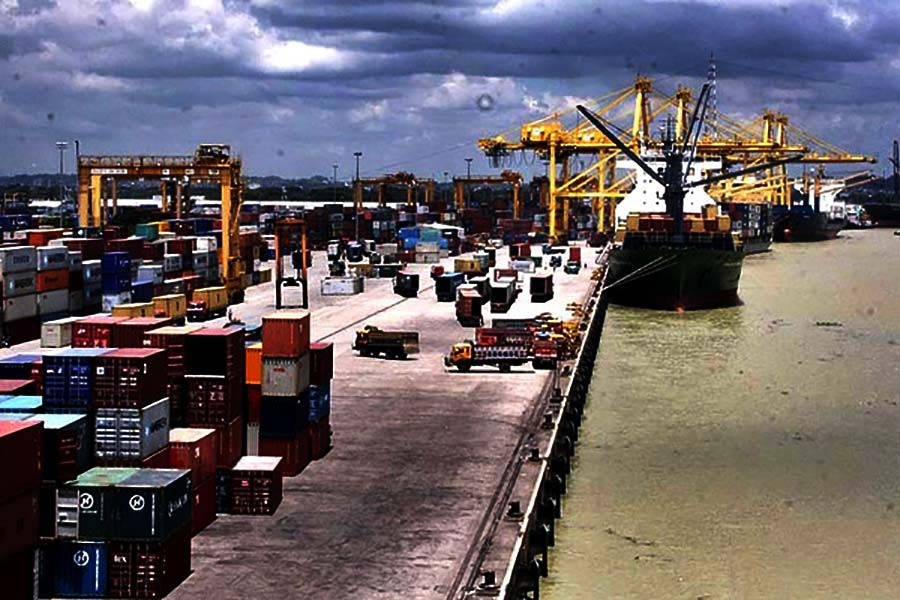Apparel trade body urges revenue board to revert to port cargo delivery

Published :
Updated :

Bangladesh's biggest export- earners --- apparel makers-are opposing delivery of imported cargoes from private depots instead of Chittagong Port as they find it "expensive and time-consuming".
The National Board of Revenue on July 25 ordered the delivery of imports from 17 such depots directly in order to ease shipping congestion at the country's premier seaport.
Usually, the depots set up around the port handle cent per cent of exports worth around US$35 billion. They also handle 25 per cent of all imports. But, after the issuance of the order, all import cargoes were meant for depots and the consignees took delivery from there.
The country's clothing-sector apex body, Bangladesh Garment Manufacturers and Exporters Association (BGMEA), Thursday applied to the Customs Authority urging it to go back to the old system of cargo handling under public sector.
It said exorbitant higher cost at the depots cause them to lose competitive edge on the global RMG market-at a time
when competitors are aggressively moving to usurp Bangladesh's position in the trade.
The BGMEA has also written to the Chairman of the NBR and the Chairman of the Chittagong Port Authority for action on the matter immediately.
Its letter, a copy of which is obtained by the FE, says that the cost at the depots is at least 118 percent higher at Tk 9,338 than the Ctg Port tariffs, applied for 20-foot-mark containers.
And 40-foot-mark container handling at the depots costs 91 percent higher at Tk 11,466 than port charges.
The association also pointed out that there is another charge called 'extra movement' which is US$ 4417 [51.97X85] for a 20-foot container and $6625 [77.95X85] for a 40-foot one.
It mentioned in its letter that there was no such extra-movement cost at the seaport.
The apparel traders also said the private depots have lack of required equipment supports, leading to delay in delivery of goods, mostly imported capital goods like raw materials and garment chemicals.
"We need 6 days to take delivery from the depots, but this is just two days from the Ctg port," Syed Nazrul Islam, first vice president at the BGMEA, told the FE over phone.
Mr Islam said that they did not raise their objection at the time when the revenue board issued the order as it was unnecessary then.
"The port now has no congestion, the ship's turnaround time has dropped to 72 hours, so we want to go back to the previous system".
He said this is a very crucial time for the clothing sector which faced closures on the back of the strict lockdown enforced to curb coronavirus transmission, which had spiked into thousands with over 200 daily deaths.
"For the interest of the clothing sector, we should go back to the earlier system," Mr Islam noted.
He, however, suggested that the Ctg Port should start construction of the Bay Terminal in order to reduce dependency on the depots owned by private businesses.
Bangladesh is now rated third-largest clothing exporter in the world as Vietnam has knocked it out of the second position, according to the World Trade Statistical Review 2021.
On the other hand, depots represented by a body named BICDA contested the allegations.
Nurul Qayyum Khan, president of the Bangladesh Inland Container Depots Association (BICDA), a representative organisation of 19 depots, said most of the allegations were not true.
"The tariff comparison mentioned in the letter is not true," Mr Khan gainsaid.
He said: "There are some delays because of the deplorable road situation in Ctg and heavy rainfalls that disrupted work at the depots."
Mr Khan mentioned that the global freight cost has shot up by 250 per cent but "We are in the same tariff status for the past eight years".
The BICDA chief said that they did a splendid job in the past more than one week by easing the port congestion.
"Port was almost shut situation-we played very time-befitting role in freeing the congestion," he said.
"There was more than 17000- TEU export backlog at depots, ships' waiting time rose to 6/7 days-these are now no more. And all credit should go in favour of us," he further said to underpin arguments from their side of the trade.
"But the reality is that we are blamed for the higher cost and delay in delivery," he added.
Bangladesh has 19 depots with two remaining shut. They have a storage capacity of 78700 TEUs. Currently they have stored 60,502 TEUs.


 For all latest news, follow The Financial Express Google News channel.
For all latest news, follow The Financial Express Google News channel.